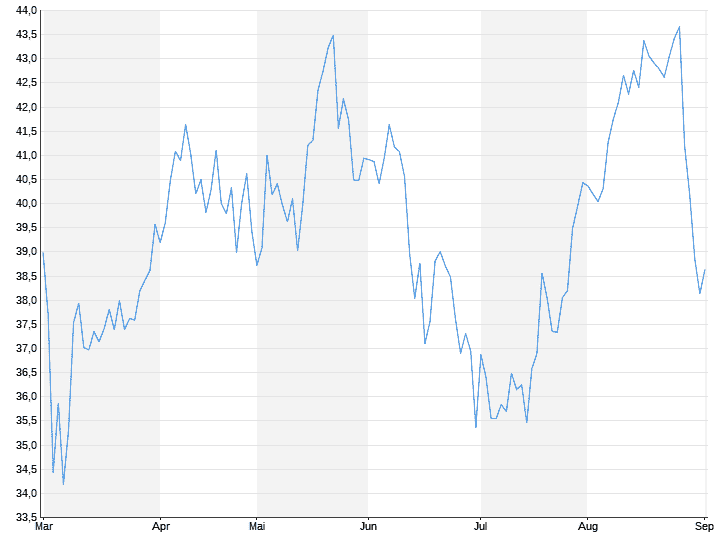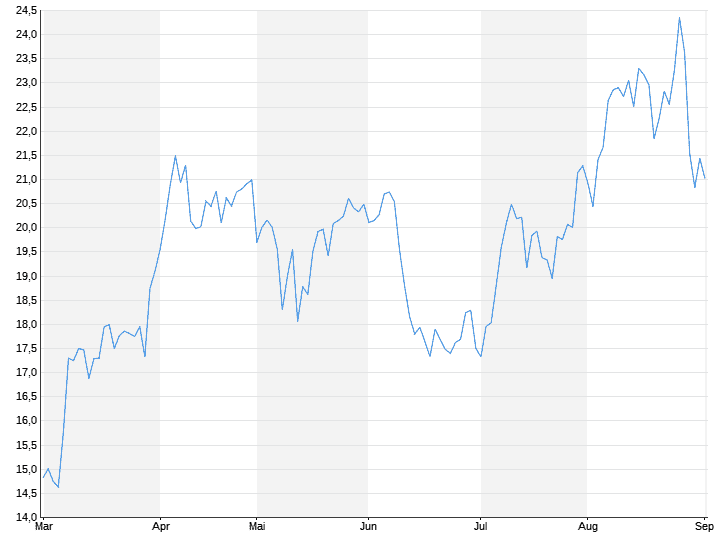One megawatt hour of electricity recently cost almost 1,000 euros. While consumers are groaning, there are industries that are reaping the rewards of record prices. Anyone who invests can participate in the boom. The only question is for how long.
One man’s meat is another man’s suffering. That was already the case during the Corona crisis. Online trade was booming, stationary trade was fighting bankruptcy. The energy crisis also has its winners and losers. While consumers and companies groan under the increased energy costs, there are sectors that are making good money from the crisis. They are the scoopers in the crisis.
Among those who do not complain about the high prices for electricity are those promoter of fossil fuels. This has to do with the fact that conventional or fossil energy sources such as natural gas, oil and coal are still used to a large extent to generate electricity and heat in Germany. Cash registers have been ringing ever since gas became scarce when deliveries from Russia were stopped. Investors who have surfed this wave have made a profit. Whether it’s BP, Shell, Chevron, Total or Saudi Aramco – the prices of the energy suppliers are up in double digits this year.
Also provider such as RWE or EnBW are among those who are happy about free-rider effects. Especially if they don’t get their electricity from expensive gas-fired power plants, but from cheaper energy sources such as hydroelectric power, biomass, solar systems or nuclear power plants. The trick is that they can still present consumers with hefty bills because the electricity price is set by the most expensive power station. What is technically known as the merit-order principle is a milkmaid’s calculation: anyone who can get something cheap and resell it at a high price because of supply bottlenecks has an economic advantage. Investors were also able to make good money here: RWE shares alone have increased by up to 22 percent this year.
operator of wind turbines and solar parks are also among the beneficiaries. But there are also big differences: only those companies that have not set their electricity prices long ago can earn a buck. This is because the market price at the time the plant is built is usually agreed with the customers for a period of 10 to 15 years. Which means prices are lagging current market prices. Since the price of electricity has exploded in a very short time, the price gap is now even very wide. Thinking about the future is worth it. Anyone who builds a solar or wind power plant now agrees supply contracts at the level of the current maximum prices. So here it is important to take a close look.
Nobody knows when the hype will end
In addition to the promoters of fossil energies, suppliers and operators of wind turbines or solar parks, there are also the dealer, who are earning handsomely from the electricity crisis: In Germany, for example, this is the Deutsche Börse in Frankfurt, which holds a majority stake in the Leipzig electricity exchange EEX (European Energy Exchange). The price explosion for electricity and gas gives the electricity exchange a high trading volume. Brisk trade means good business. The Deutsche Börse share reflects this. The price is up 16 percent this year. Analysts trust the paper even more, but the dilemma when investing in crisis beneficiaries is always the same: Nobody knows when the hype will be over.
The scientific service of the Bundestag describes such a levy as a tax that burdens the profit going beyond a “normal profit”. What should be considered “normal” and what should be considered “excess” profit can be calculated differently, as the scientific service explained in March 2021 on the occasion of the effects of the corona pandemic. In most cases, comparison periods from pre-crisis or times of peace are used and then returns that were common in these times are defined.
Investors who jump on the bandwagon now may be too late. It’s the fault of politics. You are the profiteers a thorn in the side. That is why the profits, which are mainly made by operators of power plants with renewable energies and nuclear power plants, because they can produce energy at low costs, have also become a matter for the boss. The Federal Ministry of Economics is working intensively on the introduction of an “excess profit tax” on electricity. The money will be used to finance relief for the population. So will the “excess profits” be skimmed off and if so, when? These are the crucial questions. Because at that moment the price rally should have ended abruptly. “Equity investments in power plant operators can be loss-making, since EU-wide price limits are likely to reduce the profit situation of the suppliers,” says Jochen Stanzl, market analyst at CMC Markets ntv.de.
The regulation of the energy market is in full swing. The reform of the gas surcharge, which will take effect on October 1st, shows how hard politicians are trying to put the brakes on money. The prospect of a merrily bubbling source of income will dry up for some suppliers before they can even tap into it. Regulation would normally take months, but an interim solution is also conceivable, an “emergency intervention,” as EU Commission President Ursula von der Leyen called it on Wednesday. It is also still unclear which sectors will be hit in the end. Theoretically, it could also affect manufacturers of vaccines or semiconductors. Because they are also crisis beneficiaries.
Potential electricity market regulation unsettles

There is no question that the price movements on the electricity market are extraordinary and that something must be done to protect consumers and companies in distress. A simple example calculation from CMC Markets shows how urgently: A kilowatt hour of electricity costs 41 cents on average over five years, on Friday it was a peak of 15.17 euros for electricity deliveries in one year. If you add the price of gas, which has also exploded (here the five-year average was 1.8 cents, now we are at 28 cents), then that means for a two-person household with a consumption of 2400 kilowatts of electricity plus 15,000 kilowatts Gas an annual cost increase from 1250 euros to 40,000 euros.

That can’t work. That is why regulation is necessary. Investors can participate in a boom. But a course fireworks are usually followed by a hangover. The bet becomes riskier the longer a crisis lasts, because at some point it may be overcome. The debate about the regulation of electricity prices is therefore rightly unsettling investors. A look at the RWE course shows that a large part of the profits have already evaporated. The possible electricity price regulation is also having an impact on the solar and wind park operator Encavis. On Wednesday, the papers lost three percent of their value.
“There is a high probability that legal regulation will come in one form or another. Whatever form it takes, there is an enormous regulatory risk for investors in the electricity market,” warns market analyst Stanzl. Anyone who still wants to reflexively bet on who will benefit from the electricity crisis should perhaps take a look at the prices of the Corona beneficiaries as a precaution. Many of the Highflyer Stocks of 2020 like Zoom, Peloton and Delivery Hero crashed. “What flies high can also fall low,” is the appropriate stock market adage. “Jumping on short-term trends, especially when everyone is talking about them, can be a good thing, but is usually not recommended from the perspective of risk and opportunity,” summarizes Stanzl. “Investing in long-term trends such as digitization or renewable energies is certainly the better strategy.”
Wealth accumulation summit 2022: The environment on the capital markets has changed more dramatically than it has in decades. Russia’s war in Ukraine is driving up energy and food prices, world trade is faltering, inflation and interest rates are rising rapidly. There are also challenges from climate change and rivalry with China. On the Capital’s Wealth Building Summit on September 14th Renowned experts provide orientation, present investment strategies and provide recommendations for action.
